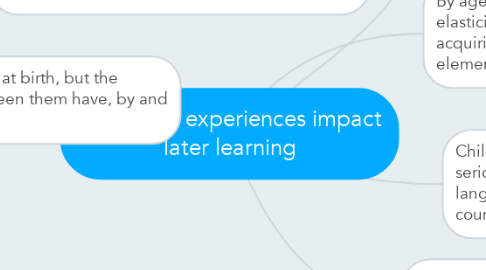How early experiences impact later learning
by madai ramirez

1. Children who experience this nurturing and the corresponding changes in brain chemistry show "far less aggressive behavior later on,"
1.1. nurturing - the development of an infant's secure relationship with an adult - stimulates the brain to develop physically.
2. Brain cells are in place at birth, but the interconnections between them have, by and large, not been made.
2.1. These connections, or synapses, form the brain's physical "maps" that allow learning to happen. In the first few months after birth, the synapses develop at a tremendous rate, a rate that slows down later
3. Scientists know that nutrition, both prenatal and immediately after birth, can significantly affect brain growth.
4. By age 10 "your brain is cooked." In other words, the brain's elasticity, its capacity to put structure around the process of acquiring and using knowledge, is pretty well set before the elementary grades are over.
4.1. A more propitious time for learning is age 3 months
5. Children who enter classrooms with moderate to serious problems related to the richness of their language are less ready to learn than their counterparts.
5.1. The basis for understanding the structure of language is set in the first few months of life


